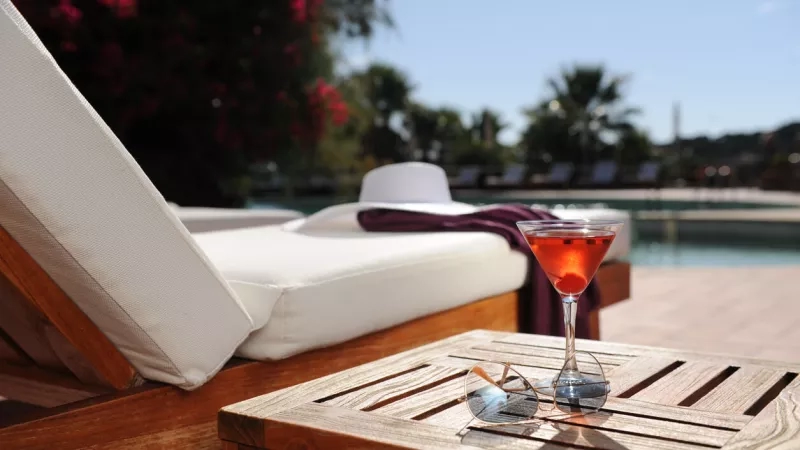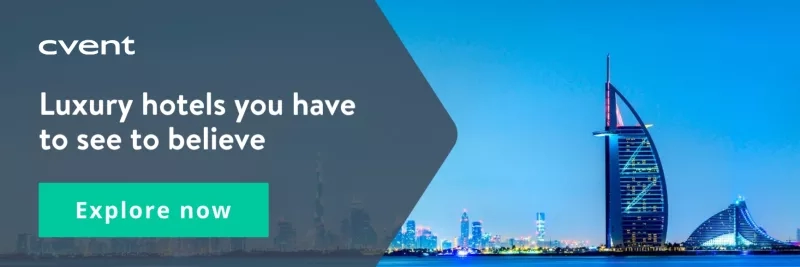
If you were asked to picture a luxurious hotel, what would come to mind first? Silk pillows on a canopy bed? A five-star spa with a mudroom and expensive champagne service? A massive resort with stunning beachfront bungalows? Luxury hotel marketing can influence the way we view the finer things in life — as well as our desire to have them. Successful luxury marketing is targeted to guests interested in experiences like the one you just imagined.
In this guide, we take a deep dive into luxury hotel marketing. We break down the role marketing plays in the luxury travel industry, how luxury hotels reach their audience through the power of personalization, and much more.
Here's everything you need to know about luxury hotel marketing
In 2019, the value of the global luxury hotel market was estimated to be over $93 billion, according to Verified Market Research, with that number expected to increase substantially in the following years. The dramatic growth forecast — that same study predicts that the market will reach $123 billion by 2027 — demonstrates that luxury hotels aren't going anywhere.
Let us help you maximize your luxury hotel marketing
What are luxury hotels?
In the most basic and fundamental sense of the phrase, a “luxury hotel” is simply a hotel that provides luxurious accommodations and experiences for its guests. There isn't an exact standard that luxury hotels must meet, such as star rating or size requirements, but there are some general characteristics that are common among these types of properties, such as:
- A star rating of four or higher.
- Lavish decorations and comfortable furniture.
- Larger rooms with high-quality amenities.
- Specialty services such as spa, salon, valet, concierge, and more.
- Fine dining options.
- Low wait times for service or assistance.
- Easy booking and excellent customer service.
Luxury hotels provide a unique standard of experiences for guests and are often seen as a destination in and of themselves. Luxury hotels typically cater to a specific clientele and aim to create the atmosphere that their audience desires.
Why are luxury hotels appealing?
Some market research shows that a high percentage of travelers are now focusing more on experiences than cost when choosing accommodations. In fact, in the 2021 Global Travel Trends Report, 61% of respondents said they'd be willing to spend more than they normally would on a trip in 2021. Luxury hotels grant guests an opportunity to indulge and truly enjoy themselves. As a result, some of those guests are willing to spend more on luxury experiences.
While guests who choose to stay at a budget hotel may be looking to save money on accommodations to spend elsewhere, perhaps at attractions or sampling the local fare, luxury hotels and resorts may be viewed as a one-stop-shop for food, relaxation and experiencing a “destination within a destination.”
Laurent Delporte, a world-renowned luxury hospitality expert, explained, “It’s not possible for everyone to like you, but the most important thing is to be very particular and to think about your customer and to create a hotel for them, because you can’t appeal to everyone. If you try to appeal to everyone, you appeal to no one.”
Comparing luxury hotels to budget hotels
Inns, hotels, motels, resorts, boutique hotels, and large chain hotels have one thing in common: They provide rooms for travelers. From there, each segment goes off in its own unique direction, primarily in terms of the service and amenities provided, as well as the cost of an overnight stay.
While budget hotels may offer services like free Wi-Fi, breakfast, and standard amenities, luxury hotels typically tend to branch out much further. Room service, valet laundry, and concierge service are common options that luxury hotels offer that may not be included at a budget hotel. A luxury hotel may have several restaurants, bars, pools, or even an in-house spa or salon, while a budget hotel may include a breakfast area, communal lobby, or private workspaces.
Luxury hotel guests can also expect different in-room amenities. When booking at a budget hotel, guests can expect the typical bathroom amenities: Soap, shampoo, conditioner, and lotion. Luxury hotel bathrooms, on the other hand, may have plush robes, slippers, razors, and facemasks. Complimentary wine, snacks, or welcome baskets are common to find in a luxury hotel room, but standard hotels may charge extra for these perks.
While levels of cleanliness should be the same across the board, budget hotels tend to be less lavish. When staying at a budget hotel, travelers usually expect a bed, TV, desk, and maybe even a couch or chair to lounge on. There’s usually enough room for 1-2 people to move around comfortably. Some rooms have coffee makers or microwaves, while others do not.
At a luxury hotel, however, guests usually get a lot more space and rooms decorated with fine linens and top-tier products. Many luxury hotel rooms include kitchenettes, jetted tubs, and additional living spaces. Luxury hotel rooms commonly range anywhere from 430-4,000 square feet. A standard hotel room, however, is 330 square feet on average.
Is luxury hotel marketing the same as regular hotel marketing?
Successful "traditional" hotel chains work hard to capture large audiences. Often centering around the goal of meeting the needs of all travelers, brand marketing may be more generalized and less targeted than luxury hotel marketing. While a brand website may highlight being pet-friendly or including a complimentary breakfast buffet for all guests, a luxury hotel marketing plan may be tailored more to a specific audience.
Luxury hotels often develop highly personalized and targeted marketing to reach their clientele. By tracking visitor activity on their website, past guest stays, and other data, luxury hotels are able to see what their guests want, and what they may want in the future. This high level of personalization provides past, present, and future guests with marketing that is relevant to their financial circumstances and individual tastes and interests.
How do luxury hotel websites make themselves stand out?
Web presence is an important part of luxury hotel marketing. Many large chains have strict policies and brand standards about what can or cannot be included on a hotel’s main page. As a result, many brand hotels, or smaller hotels lacking a marketing team, can miss out on opportunities to make their website stand out. This is where luxury hotel marketing can shine.
Review the websites for a few different luxury hotels that offer similar services and amenities. What do they have in common? For starters, luxury hotel websites tend to:
- Provide a user-friendly experience for both mobile and desktop users.
- Have clear headlines, bullet points, and information tabs.
- Provide detailed information for guests.
- Highlight a unique personality or history.
- Make the booking process appealing and seamless.
- Showcase specific room and property amenities.
- Clearly outline available services.
- Promote experiences and services over savings.
- Offer the option to book appointments and reservations.
- Link to social media and review sites.
- Provide clear paths to prompt communication with staff.
In 2018, Deloitte completed a study of the luxury hotel market; it found that Millennials and Gen Zers account for 30% of luxury buyers. Moreover, the report found that these luxury buyers are looking for a mix of online and offline experiences, and they expect to be able to interact with luxury brands digitally.
What marketing strategies should luxury hotels use?
We’ve included different marketing strategies that luxury hotels can benefit from. Review the list and see if implementing any changes to your marketing efforts could help attract more luxury travelers.
1. Show pride in your product. Tout your property's brand, location, and exclusive services. Promote a "sophisticated" lifestyle and high-end in-room amenities. Don’t be afraid to list high-quality products you provide, expensive services you offer, or even brag about your brand. Do you have a reputation for luxury and indulgence? Own it!
2. Create targeting marketing that focuses on personalization. A Salesforce study found that up to 52% of travelers consider themselves likely to switch brands if they sense a company doesn’t put effort into personalizing their customer communications. Modern travelers want to feel like their needs are understood and that their expectations will be met — especially when shelling out the extra cash for a luxury hotel stay.
3. Market value over price. You’ve probably heard the phrase, “you get what you pay for,” right? Luxury hotel travelers tend to expect higher levels of service at luxury properties. They’re willing to spend more to get more, essentially. Instead of dropping prices to be more competitive, consider working on showcasing your value. Guests who are booking at high price points are expecting a high level of value, so clearly outline what guests at your hotel will receive and experience when they book with you.
4. Create mobile-friendly content and marketing materials. The amount of money that businesses spend on mobile advertising is on the precipice of overtaking traditional web-based ad spending for the first time, according to Statista research. Luxury hotels would be wise to consider investing a significant portion of their marketing budget on mobile advertising and marketing to help ensure that all of their bases are covered.
5. Explore your hotel’s one-of-a-kind history. Highlight what makes your hotel unique. If your property has historical significance or an interesting history of its own, explore using that information in your marketing. Help boost the idea that your property is truly something special by telling its origin story.
6. Research your top-spending VIP guests. Why do they choose to stay and spend their money with you? Perhaps they have specific room type or amenity preferences. Maybe they feel like they always have a memorable experience when staying with you. No matter the reason, engage with your best guests to help get an idea of how you can better target your marketing efforts to appeal to travelers looking for a similar experience.
7. Invest in a top-tier web presence and manage your online reputation. Your hotel website or social media accounts may be the first thing that prospective guests encounter when looking for accommodations in your area. Invest some time and allocate a portion of your marketing budget to maintaining a strong online presence. While some hotels have an on-site marketing team responsible for online reputation management, other luxury hotels may choose to outsource this critical strategy to digital marketing professionals. Either way, website management should be delegated to the most capable candidate(s).
What tools are available for luxury hotel marketing?
There are a wide variety of tools and apps that hoteliers can use to improve their luxury hotel marketing. From improving your website's content to boosting your hotel’s search results, here are some helpful tools to consider.
- Lodgify. Lodgify is a website design tool that helps users create a webpage that guides visitors’ eyes to important areas — like a booking button, for example.
- Hootsuite. Hootsuite is a social media scheduling tool that busy hoteliers can use to plan out future content. Use this tool to improve posting efficiency, manage social media profiles, and even get analytic reports to see how your content is performing.
- Awario. Awario is considered a “social listening tool.” Hospitality professionals can follow conversations on the web and see what guests are saying about their property, as well as follow trends in their area and in the hospitality industry as a whole.
- Social media. Showcase high-quality photos and videos of your property on social media. Share your high-end services and top-quality amenities on visual platforms, like Instagram, to create engaging, compelling content. Encourage your guests to post user-generated content on your social media accounts as well.
- Search engine optimization tools. Use tools like Semrush or Moz to improve your overall SEO efforts. These tools can monitor keyword rankings, track visitor activity, and help your hotel boost its online visibility by maximizing your organic search rankings.
- Data analysis. Because so much luxury hotel marketing is digital, luxury properties should keep a close eye on their online performance. Tools like Google Analytics can help you identify how much traffic your content is generating, allowing you to pinpoint what marketing strategies are performing well.
- Luxury magazines. If your budget allows for it, consider running an in-depth profile of your luxury hotel in a print magazine. While we’re racing toward a digital world, print marketing is still valued by some customers, especially in the luxury market. As stated by experts at Lombardo, "print is always in fashion” for luxury brands. Research lodging publications that advertise luxury properties. Cvent Meetings magazine, for example, annually publishes in-depth profiles for a variety of luxury venues.
RELATED: 27 must-have hotel marketing tools
Start boosting your luxury hotel marketing efforts today!
Remember, while many of the marketing strategies implemented by luxury hotels may be the same as those implemented throughout the industry, there are also many significant differences. The key is to pinpoint those differences and what makes your property — and your audience — unique.
Up next, check out 13 of the world's most luxurious hotels for even more inspiration.







